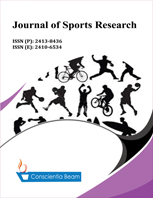Quality Management of Olympic, Non-Olympic and Paralympic Sport Federations
DOI:
https://doi.org/10.18488/journal.90/2015.2.4/90.4.141.151Abstract
Total Quality Management (TQM) is a strategic process of continuous improvement targeting success in sport with numerous additional benefits. Its application commenced in business, next in public administration and then in the third sector. Some researchers studied clubs but fewer researchers have studied federations. Consequently, the purpose of this article is to measure the TQM of a group of Galician Sport Federations. We used an adaptation of European Foundation of Quality Management (EFQM) questionnaire issued to Federations before this study. The sample was 50 of 59 entities (86.21%) divided in: 26 Olympic Federations (52%), 21 non-Olympic Federations (42%) and 3 Paralympic Federations (6%). The results of the questionnaire gave information about the TQM of the entity and which particular dimensions were managed poorly, regularly, well or very well. Whether they are Olympic, Paralympic or Non-Olympic, results show that all these Federations achieved a “good” score in Total Quality Management, with “very good” indications in dimensions such as Policy, Strategy and Process Management. The Olympic Federations returned “regular” results in the “People” category. Paralympic Federations generated “regular” scores in Leadership, Human Resources, Society Results and Process Results. Similar returns have been found in other studies. Knowledge of the overall TQM scores and the dimensions provides information regarding areas that require to be maintained, changed or developed. Based on the results of the questionnaire, practical beneficial recommendations could subsequently be readily and usefully implemented. We suggest that further researches could help to construct a TQM system for these organisations. Availability of such information would support and facilitate good management of these entities, thereby enabling improved management in all respects: effectiveness, efficiency, efficacy and economy.

